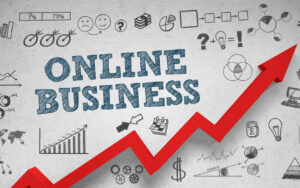In the digital age of 2025, building a sustainable online business is more than just a pipe dream; it’s an achievable reality for those willing to put in the work. Whether you’re a serial entrepreneur or just dipping your toes into the entrepreneurial waters, the landscape is both promising and competitive. But don’t worry, you don’t need to be a tech wizard or a marketing guru to succeed.
In this guide, we’ll explore 10 key factors that will help you build a sustainable online business. From understanding your market to leveraging technology, we’ll cover everything you need to know to thrive in the digital world. Buckle up, and let’s embark on this exciting journey together!
Why Sustainability Matters in Online Business
When we talk about sustainability in business, we’re not just discussing eco-friendly practices (though those are important too!). It’s about creating a business model that can withstand the test of time.
Benefits of a Sustainable Business Model
- Long-Term Profitability: Sustainable practices often lead to lower costs and higher profits.
- Customer Loyalty: Consumers today prefer brands that are environmentally and socially responsible.
- Resilience: A sustainable business can adapt to changes in the market and consumer behavior.
According to a 2024 survey by Deloitte, 80% of consumers are more likely to support brands that are committed to sustainable practices.
“Business opportunities are like buses; there’s always another one coming.” — Richard Branson. But don’t miss the bus by failing to build a sustainable model!

—
Factor 1: Understand Your Target Market
Know Who You’re Selling to.
The first step in building a sustainable online business is knowing your audience. Without understanding who your customers are, you might as well be throwing spaghetti at the wall and hoping something sticks.
- Create Buyer Persona: Develop detailed profiles of your ideal customers based on demographics, interests, and pain points.
- Conduct Market Research: Use surveys or social media polls to gather insights about what your audience wants.
- Analyze Competitors: Look at who your competitors are targeting and identify gaps in the market.
“Trying to sell to everyone is like trying to hug a cactus—painful and pointless!”
—
Factor 2: Develop a Strong Brand Identity
Make Your Mark
In a crowded online marketplace, a strong brand identity sets you apart. Your brand isn’t just your logo; it encompasses your mission, values, and the way you communicate with your audience.
- Define Your Brand Voice: Decide how you want to communicate with your audience. Are you formal, casual, or quirky?
- Create Visual Consistency: Use consistent colors, fonts, and imagery across all platforms.
- Share Your Story: Authentic storytelling helps build a connection with your audience.
“Your brand is a story unfolding across all customer touchpoints.” — Jonah Sachs.
Make sure your brand resonates with your target market. If your audience loves humor, don’t be afraid to inject some sarcasm into your messaging!
—
Factor 3: Build an Engaging Website
Your website is your online storefront, and first impressions matter. An engaging website can keep visitors on your page longer, increasing the chances of conversion.
- User-Friendly Design: Ensure your website is easy to navigate. Complicated layouts drive users away faster than a bad date.
- Mobile Optimization: In 2025, if your website isn’t mobile-friendly, you’re missing out on a huge chunk of potential customers.
Compelling Content: Use clear, engaging content that communicates your value proposition effectively.
According to a report by Google, 53% of mobile users will abandon a site that takes longer than three seconds to load. So, let’s keep it speedy!
“Websites promote you 24/7: No employee will do that.” — Paul Cookson. Make sure your website is doing its job!
—
Factor 4: Embrace Digital Marketing
Building a sustainable business isn’t just about having a great product; it’s also about how you market that product.
- SEO (Search Engine Optimization): Optimize your website and content to rank higher in search engine results. Keywords are your best friends!
- Social Media Marketing: Use platforms like Instagram, Facebook, and TikTok to engage with your audience and promote your brand.
- Email Marketing: Build a mailing list and keep your audience informed about new products and promotions.
“Marketing is really just about sharing your passion.” — Michael Hyatt.
Don’t just market your products; share stories and create a community around your brand. People love to feel connected!
—
Factor 5: Diversify Your Income Streams
Don’t Put All Your Eggs in One Basket.
In the world of online business, relying on one source of income can be risky. Diversifying your income streams can create a more stable foundation.
- Multiple Products or Services: Offer a range of products or services to cater to different customer needs.
- Affiliate Marketing: Promote other businesses’ products and earn a commission for each sale made through your referral.
- Online Courses or Workshops: Share your expertise and create additional income through educational content.
According to a study by the U.S. Small Business Administration, businesses with diversified income streams are **50% more likely** to survive their first five years.
“Don’t put all your eggs in one basket. Put all your baskets in one egg.” — Unknown. (Okay, maybe I’m paraphrasing, but you get the idea!)
—
Factor 6: Monitor Your Finances
Understanding your financial health is essential for a sustainable business. Ignoring your finances is like steering a ship without a compass—you might end up in uncharted waters!
- Use Accounting Software: Invest in tools like QuickBooks or FreshBooks to track income and expenses easily.
- Regular Financial Reviews: Conduct monthly reviews to understand where you stand financially.
- Set a Budget: Establish a budget to manage expenses and allocate funds for growth.
“The numbers don’t lie, but they can be misleading.” — Unknown.
Don’t let financial stress snowball. Regular monitoring can help you catch issues before they become major problems.
—
Factor 7: Build a Support Network
No one succeeds alone. Building a support network can provide valuable resources, advice, and encouragement.
- Join Industry Groups: Participate in local or online networks where you can connect with other entrepreneurs.
- Find a Mentor: Seek out someone with experience who can share insights and guide you through challenges.
- Collaborate with Others: Team up with other businesses for joint promotions or projects.
“Alone we can do so little; together we can do so much.” — Helen Keller.
Think of your network as your personal Avengers team. Together, you can conquer challenges and take on the world!
—
Factor 8: Adapt to Change
In the digital age, change is the only constant. Being flexible and adaptable is essential for long-term success.
- Stay Informed: Keep up with industry trends and emerging technologies.
- Be Open to Feedback: Listen to your customers and adapt your offerings based on their needs.
- Innovate: Don’t be afraid to try new things! Experimentation can lead to opportunities you never imagined.
Research shows that companies that adapt quickly to market changes are **60% more likely** to outperform their competitors.
“Change is the law of life. And those who look only to the past or present are certain to miss the future.” — John F. Kennedy.
—
Factor 9: Prioritize Customer Experience
In 2025, businesses that prioritize customer experience will thrive. Happy customers are likely to return and spread the word.
- Engage with Customers: Respond to inquiries and feedback quickly. This shows you care!
- Personalize Interactions: Use customer data to tailor experiences. People love feeling special.
- Provide Value: Offer quality products and exceptional service.
“Your most unhappy customers are your greatest source of learning.” — Bill Gates.
Consider using surveys to gather feedback on customer experiences. This can help you improve and adapt.
—
FAQs
Q1. How can I start building passive income streams?
A: Begin by identifying your skills and interests, researching market needs, and exploring various income-generating opportunities.
Q2. What are the best platforms for selling digital products?
A: Platforms like Etsy, Amazon, or your own website can work wonders for selling digital goods.
Q3. How do I know if my marketing strategies are effective?
A: Monitor engagement metrics, conversion rates, and customer feedback regularly to assess performance.
Q4. Should I hire a financial advisor?
A: If you feel overwhelmed by financial decisions, seeking expert advice can be beneficial.
Q5. How often should I update my business strategy?
A: Aim for regular reviews, especially after significant market changes or personal milestones.
—
Building a sustainable online business in 2025 requires a blend of creativity, strategic planning, and an unwavering commitment to adaptability. By following these eight key factors, you’ll not only set the foundation for success but also enjoy the journey along the way.
Have in mind that, every successful entrepreneur started somewhere, and now it’s your turn! Embrace the challenges, celebrate the victories, and keep pushing forward. You got this! Happy investing!









49buwn
14gpx7
zyh7o8
ngqjoe